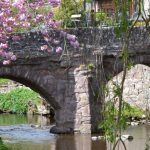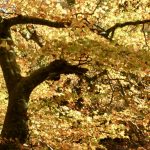As part of our 2021 ‘Museum of Rapid Transition’ programme, delivered in partnership with Alyth Development Trust, we have designed three projects to coincide with Scotland’s hosting of the UN Climate Change Conference – COP26 – in Glasgow at the beginning of November.
All inspired by the natural and cultural heritage of the Ecomuseum, the projects aim to both mark this very historic event locally and create experiences that help our communities and visitors take rapid climate action and transition to more regenerative ways of living.
Both the Ecomuseum and ADT believe that engaging people with their heritage has huge, currently under utilised potential to help people build more regenerative and resilient lifestyles and mobilise climate action in two primary ways. They are a knowledge & learning resource which can help contextualise what is happening and develop skills and mitigation strategies that build adaptive capacity and they are a participative force which can bring people together, challenge the status quo and create spaces both physically and in our minds to imagine that anything is possible.
TURNING POINTS is one of these projects.
A 50 metre long 2 metre high timeline of 20,000 years of climate change in this part of Scotland will be exhibited outside in the centre of the historic town of Alyth in the Ecomuseum from the 30th October until the New Year. You can view the ‘scroll’ of the timeline here.

Glacier, photo wikimedia commons
Content has been developed by one of Scotland’s foremost environmental scientists, Dr Richard Tipping and designed by Exhibition Designer Cavan Convery.
Richard recently retired from a Senior Lectureship at the Division of Biological and Environmental Science at the University of Stirling. He has worked on issues of environmental change throughout Scotland for some 40 years, as a palaeoecologist, geomorphologist, geo-archaeologist and environmental historian. Cavan has extensive experience designing for exhibition and print, primarily in the science and art sectors, for clients such as the National Galleries of Scotland, The Royal Collections Trust and The Royal Botanic Garden Edinburgh.
The message of the exhibition is simple.
“Our climate is changing. This is not the first time it has changed as this exhibition shows, but it is the first time it has been changed by us.
By burning fossil fuels, cutting down forests and farming livestock we are increasing greenhouse gases which trap the sun’s heat and stop it from leaking back into space.
As a result our planet home is heating up.
In Scotland, temperatures are increasing across all the seasons. Our weather is becoming more variable and extreme – our hottest days are getting hotter and our wettest days are getting wetter – leading to more droughts and flooding.
A rapid decline in biodiversity, closely linked to climate change is also being driven by our behaviour. The methods we use to generate energy and our levels of consumption have begun the sixth mass extinction in the Earth’s history. In Scotland, wildlife decline is faster than in the rest of the UK.
These twin global crises of climate change and biodiversity loss require us to rebalance our relationship with nature if we are to secure a healthier planet.
This decade is the turning point for how we achieve that new balance.
Our exhibition shows how humans adapted throughout history when faced with similar challenges.
Will we use these lessons from the past to shape a brighter future?”
The Exhibition will be opened by John Swinney MSP and the Alyth Eco-Kids at 11.00am on Saturday 30th October. All are welcome!

Wildfire, photo Wikimedia Commons
Connected to the Turning Point exhibition, and in partnership with Creative Dundee, artist in residence Nicky Bolland is working with the community of Alyth to generate a collective ‘Great Imagining’ which will cast the timeline forward into the future – depicting, via another piece of public art, what that future could be if regenerative actions were taken. Part of Creative Dundee’s CULTIVATE programme, Nicky’s work aims to collaboratively engage, create and produce locally relevant work, with a climate and social justice lens.
A visual-artist, maker and community worker, Nicky has worked with communities across Scotland and internationally on a wide range of issues and using different creative methods.
Nicky said, “Alyth is the first community in Perthshire where I spent meaningful time. I think of Alyth as a place with strong community networks where interesting things happen, but I know it is also a place where the climate crisis is already felt – in the form of regular flooding, exacerbating the existing challenges that so many small rural communities face.
“There is often an active tension in rural communities between what has come before and what might lie ahead. I see this project as an opportunity to meaningfully address these tensions, through compassionate dialogue, taking the heritage of Alyth as the springboard for co-creating a different future. I can’t wait to get talking to the locals, including the younger generation, find out what they think and use the lessons from the past to shape a better and more sustainable future.”

Nicky at the Alyth Community Action Plan event in October 2021, photo Clare Cooper
The 2021 Museum of Rapid Transition Programme has been made possible by grant funding from Paths for All, The Gannochy Trust, The People’s Postcode Lottery Trust, the Cairngorms National Park, NatureScot, The Thompson Trust and Perth & Kinross Council, with further investments made by the Cateran Ecomuseum’s own Directors. The Awakening has been made possible by the generosity of the Dalmunzie Estate and Ferngreen Nursey, Forfar with promotional support from Blairgowrie & East Perthshire Tourism Association and Visit Scotland.

